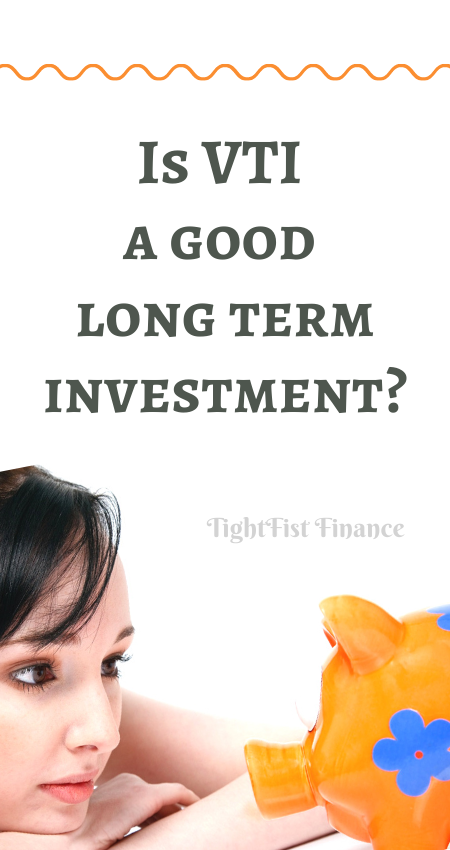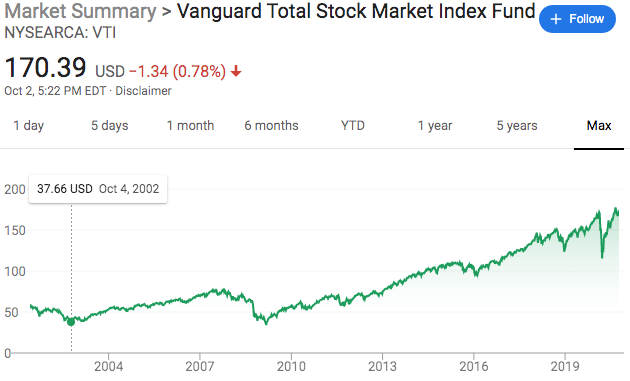Is VTI a good investment for the long term?
The Vanguard Total stock market fund (VTI) is a good investment for buy-and-hold investors. VTI has had an annualized return of 7.6% since inception. The fund contains over 3,000 stocks which makes VTI a well-diversified portfolio.
Imagine, having one fund to invest in the overall US Stock Market. Not only is this fund well-diversified, but it is very cheap compared to similar funds.
Luckily for you, I’m going to break down why you should invest in VTI. Investing doesn’t have to be complicated when you hold a good ETF like VTI. Keep in mind, no investment is risk free, but long term investing reduces your risk.

This article may contain affiliate links which pays a commission and supports this blog. Thank you for your support!
Is VTI a good long term investment?
The Vanguard Total stock market fund (VTI) is a good long-term investment. The fund is well-diversified and has had an annualized return of 7.6% since inception. Investing $10,000 into VTI 10 years ago would be worth around $35,000 today.
For the most part, VTI has continued to rise in price year-over-year. However, the worst year for VTI was in 2008 during the financial crisis. VTI lost around 37% of its value.

VTI tends to see more good years than bad. In 2013, VTI grew by 33.5%. From 2005 to 2019, VTI only had three years of negative returns.
Past performance does not guarantee future results. However, my personal opinion is the stock market continues to increase over time. I have no reason to believe the US Stock Market will decrease consistently over time.
VTI also has a low-cost management fee 0.03%. Similar funds may cost around 0.91%. For example, $10,000 in VTI would cost you $71 over 10 years compared to $2,068 for a similar fund.
Click to Tweet! Please Share!Click To TweetIs VTI actively managed?
VTI is not an actively managed fund. Instead, VTI follows a passively managed, index sampling strategy. Therefore, no fund manager makes decisions on which stocks should be held. Instead, this fund seeks to track the overall stock market performance.
Therefore, investing in VTI allows you to track your results with the performance of the stock market. You should expect your portfolio to rise when the stock market rises. Alternatively, you should also expect your investments to decline with poor stock market performance.
All VTI is doing is tracking overall performance of the stock market. VTI attempts to maintain a close correlation between the fund and overall stock market.
An actively managed fund is different. Actively managed funds have a fund manager looking at company performance. These managers will make purchasing and selling decisions based on the research.
Does VTI pay a dividend?
VTI does pay a dividend and has continued to pay a dividend since inception. There have been consistent dividend increases year-over-year. Therefore, holding VTI not only pays a dividend, but has consistently seen regular dividend increases.
Generally, VTI maintains a dividend yield around 1.5 to 2% . According to Seeking Alpha, the four year hold a good ETF.
Dividend increases are an amazing thing. A dividend increase allows you to get a pay raise simply by holding shares.
For example, investing $10,000 in 2002 (Assuming 186 shares) would have yielded $116 in dividends or 1.2% ROI. In 2019, the same 186 shares would yield $540 in dividends or 5.4% ROI.
The above example only factors in dividend increases. You could have reinvested your dividends, added capital, and capital gains are not factored in.
Is VTI better than VOO?
VTI and VOO are two different index funds, but have similar performance. VTI tracks the overall stock market performance while VOO the S&P 500. Both VTI and VOO have produced similar returns over the last 10 years. VOO has returned 13.7% over the last 10 years while VTI returned 13.48%
Both VTI and VOO are Vanguard selected funds. Both pay similar dividends and have a similar rate of return over the last 10 years. VOO tracks the S&P 500, a collection of the US top 500 companies.
VTI and VOO both have an expense ratio of 0.03%. Therefore, you are paying the same cost no matter which you choose.
The main difference between VTI and VOO is the level of diversification. VOO contains only the top 500 stocks. However, VTI contains the top 500 stocks plus an additional 3000 stocks to track the market performance.
Therefore, by purchasing VTI you are actually also purchasing VOO. VTI includes more exposure to mid and small-cap stocks.
However, VTI is weighted based on market cap. The top 500 stocks hold a significant weight in VTI, with a small weight given to mid and small-cap stocks.
It doesn’t matter which fund you buy. Both VTI and VOO are perfectly good choices. My personal preference is to purchase VTI for the slight level of diversification.
Should I buy VTI or VTSAX
VTI and VTSAX are similar investments, but VTI is a Vanguard ETF and VTSAX is a Vanguard mutual fund. VTI has an expense ratio 0.01% cheaper, offers real time trading, and requires a minimum investment of one share. VTSAX allows you to have automatic investments and withdrawals.
Both VTI and VTSAX track the total stock market index. However, VTI is considered a Vanguard ETF while VTSAX a Vanguard mutual fund.
VTI has an expense ratio of 0.03% while VTSAX is 0.04%. Generally, the difference of 0.01% isn’t worth fighting over.
VTSAX is priced at the stock market close while VTI offers real time trading. Therefore, everyone buys VTSAX for the same price on the same day. Investors who are investing for the long haul shouldn’t care about minor day price changes.
VTSAX requires a minimum investment of $3,000 while VTI requires one share price. Therefore, you have more flexibility starting your investments with VTI.
The major difference between VTSAX and VTI is automatic withdrawals and deposits. Only VTSAX allows you to automate your investments. With VTI, you will have to manually invest each purchase.
Click to Tweet! Please Share!Click To TweetSummary: Is VTI a good long term investment?
As you can see, VTI is a good long term investment. VTI seeks to track overall stock market performance, containing over 3,000 stocks. Since inception, VTI has had annualized returns of 7.6% and has an inexpensive expense ratio of 0.03%.
VTI follows a passively managed, index sampling strategy. There is no active fund manager trading stocks in and out of the portfolio. Instead, VTI is a market cap weighted fund which tracks stock market performance.
VTI does pay a dividend. Over the last four years the dividend yield average has been 1.84%. VTI has consistently seen dividend increases since inception.
VOO tracks the S&P 500 and is often compared to VTI. Both index funds have similar performance and features. The main difference is VTI contains the VOO holdings, but also an additional 3,000 stocks. However, VTI is a market cap weighted fund and the VOO holdings make up the majority of VTI.
VTSAX is the mutual fund version of VTI. The major difference between the two is VTSAX allows for automatic withdrawals and deposits. VTSAX requires a minimum $3,000 investment while VTI requires one share to be purchased.